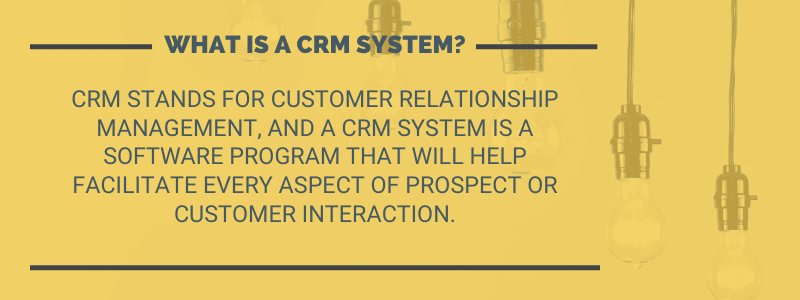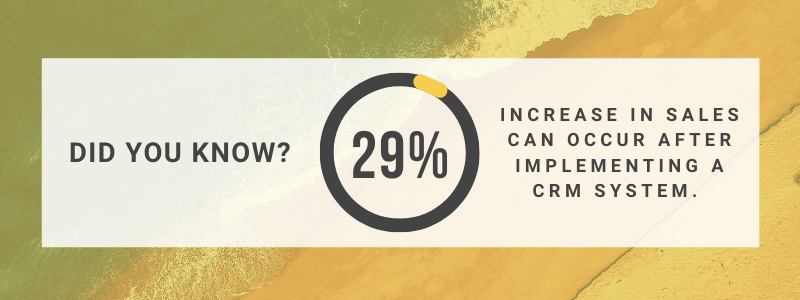Over half of consumers (54%) report that their expectations are growing when it comes to customer service experiences. That means that today’s small businesses need to step up their game if they want to give prospects and customers what they’re looking for. Our Nashville-based business service consultant knows from experience that one of the surest ways to improve prospect and customer relationships is by implementing a robust CRM system that will do much of the work for you.
First, what is a CRM system?
Before we lay out our case as to why you need to add a CRM system to your small business marketing strategy, let’s go over what CRMs are, exactly. CRM stands for Customer Relationship Management, and a CRM system is a software program that will help facilitate every aspect of prospect or customer interaction.

CRMs take lead and customer information from all the disparate places it’s coming in – from phone calls and emails, to contact forms and requests for information online – and compile it all in one database. Employees from all departments can access this centralized database, which will contain things like:
- Basic customer information (name, phone number, etc.)
- Demographic information (business type, location)
- Customer type and purchase information
- Notes describing previous interactions with your company (speaking to a salesperson, calling customer service, etc.)
Naturally, each CRM system has slightly different features, and most are customizable to suit each company’s needs. If you feel like choosing the right system for you is a little out of your comfort zone, find a reputable business service consultant to help you narrow down your options through their business consultants services.
Why a CRM system is right for your business
We wouldn’t be a good agency if we doled out advice without backing it up. That’s why we’re going to break down exactly what a CRM system can do for your business – besides increasing your sales by up to 29%.

Whether you’re just starting to get your small business marketing strategy together or are taking the next step with marketing automation, a good CRM system might be just the extra help you need to communicate more efficiently with your customers and prospects.
So why does our agency in Nashville love CRMs so much?
Keep your leads and customers all in one place
Having all of your customer information housed in one place has a ton of value all on its own, as our business service consultant has seen time and again.
The people in your company will have immediate access to:
- Individual client information, including changes in point-of-contact, leadership, or business model
- A clear picture of the trends of your clients and prospects
This easy access to information also gives your management a transparent view into the activities of your sales agents.
Salespeople of all kinds are under pressure to sell more and more for their company. Sometimes, this can create an environment of exaggerating, or even lying, about sales opportunities, which helps no one.
A CRM system allows sales and accounts teams to track all contact with active opportunities and update the sales stage as the opportunity moves through the sales funnel.
Then your management team can use the sales stages to project future revenue based on how many deals are in each stage. This will make it easier for your leadership team to understand the level of investment they can make in things like new hires or large purchases.
Of course, although sales activity is easier to track when using a CRM, it doesn’t make it foolproof. Make sure that your sales leaders are still holding your team accountable for their quotas and understanding the sales challenges that individuals face.
Know your leads better than ever before
We’ve talked before about how important it is to know who your ideal customers are so you can target them effectively in marketing campaigns. But CRMs take getting to know your prospect list to a whole other level.
A CRM system can help you track pretty much anything you want to about your prospect:
- Basic info: name, email, phone number (so you can always get in touch)
- Transaction or contact history (so you know their likes and pain-points)
- Custom fields like birthdays or Twitter handles (so your team can go the extra mile with reach-outs)
What you focus on when tracking prospect information will vary depending on the type of company you have. For example, our agency recommends that B2B companies keep track of things like competitor contract termination dates so you can plan your next contact accordingly.
Transition customers from one team to the next
Depending on what your business model is, you might have specific employees handle different parts of the customer journey.
For example, many companies separate business development (prospect outreach) and often referred to as ‘biz dev’, from account management (ongoing management) once the client is signed on. In this example, a customer moving through your company might look like this:
- The customer makes a purchase from your biz dev team (hooray!).
- The biz dev team tells the new customer to expect a call or email from the account management team.
- The biz dev team spends time compiling notes from all of their interactions with this customer so far, noting anything the account managers need to know.
- The two departments schedule a time to meet so they can discuss the transition.
- Meanwhile, the customer is still waiting for contact, having heard from no-one. Cue unhappy customer and one that may not stick around.
A CRM system streamlines this whole process. Most CRMs collect all email correspondence, proposals, and other sales-related notes for each prospect opportunity. All of this information will be available to the relevant team as soon as the person / team assigned to the account is updated in the system. This makes the customer hand-off process incredibly efficient, keeping your new clients happy from day one.
Whether you work with a company or handle company growth on your own, the more you scale your business, the more important it will be to iron out processes like the one described above.
Personalize lead and client interaction
A returning customer is up to nine times more likely to buy from you than a new lead, and they tend to spend more with each purchase. In other words, nurturing relationships with current or past customers is a vital part of any small business marketing strategy.
A CRM system is an excellent tool to help you do this, since you’ll already have all their shopping habits right there at your fingertips.
For example, say you’re opening a new location in Nashville – a CRM system can help you send a targeted email only to customers in middle Tennessee to invite them to the grand opening.
One thing to remember, though – make sure your messaging isn’t too salesy. This is one of the things our business service consultant sees companies frequently get wrong.
Your main goal should be to inform your audience of new updates to your business and offerings, just to keep them in the loop. The exposure alone will keep you top-of-mind when your audience is ready to purchase, without making your business come across as pushy or desperate.
Automate lead nurturing
Businesses in 2022 and beyond need to focus on two things:
- Growing their businesses
- Scaling their operations to keep up with said growth
Of course, you have to nurture leads if you want to increase sales, but doing so can be incredibly time-consuming, especially as your growing business pulls you in more directions than ever.
Marketing automation can allow you to push out personalized emails with virtually no effort on your part. You simply tell the marketing automation software what email to send when a lead or customer’s actions triggers it. Triggers might be:
- Clicking on an ad
- Opening a marketing email
- Making a purchase
- Signing up for a webinar
As your business grows, marketing automation can help you nurture leads and provide value while limiting human interactions.
Get analytics right at your fingertips
Every small business owner is familiar with the old adage, “more money, more problems.” The larger your business grows, the more important it will be to answer questions about the direction you want to take the company in.
If you work with a skilled business service consultant, one of the first things they’ll do as part of their business consultant service is to help you get past your business’s growing pains and answer these questions, is to analyze your prospect and customer information so you can use it to guide your decisions.
Think about how nice it would be to have easy access to information like:
- How clients interact with your business
- Your most popular products or services
- Your most popular content
- Your closing rates
- Your average deal size
Housing all of your client interactions in one CRM system makes it easy to track and analyze this type of data, so you can adjust everything from your small business marketing strategy and operations to staffing decisions, based on the trends you discover.
Not sure how to start? Let our business service consultant help
If some of the ideas discussed in this article appeal to you but leave you unsure how to get started, you might benefit from a little help. Take the Stairs is a business service consultant based in Nashville, TN, and we love giving small business owners the business consultants services they need to grow their businesses.
If you’d like to hear more about how our lead generation or CRM implementation services can help your business, reach out now to schedule a discovery call.










